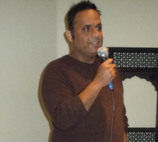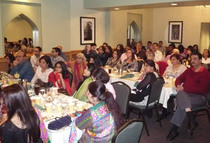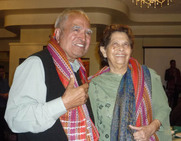
BY HIRO BADLANI
ARTESIA, CA - International Women’s Day was celebrated by the International Sindhi Women Organization at a packed newly renovated Woodland Restaurant here on Mar. 8. The packed to capacity hall drew mainly Sindhis, both Hindus and Muslims hailing from India and Pakistan. The atmosphere was cordial with past bitter memories, associated with many an old wound, kept on hold. Sindhis originating from...
ARTESIA, CA - International Women’s Day was celebrated by the International Sindhi Women Organization at a packed newly renovated Woodland Restaurant here on Mar. 8. The packed to capacity hall drew mainly Sindhis, both Hindus and Muslims hailing from India and Pakistan. The atmosphere was cordial with past bitter memories, associated with many an old wound, kept on hold. Sindhis originating from...
both sides of the border met perhaps for the first time in such big numbers and celebrated the occasion with gusto, good music, fine speeches, delicious food and warm hospitality.
The program started with Sindhi folk music videos played on the large screen while guests enjoyed an array of tasty appetizers. After a brief introduction, the event got off with the Panel Discussion by four empowered speakers.
Sobhya Agha started the ball rolling. With her past experience in the criminology department in Karachi, she narrated many instances of crime and violence against women. She showed photographs of atrocities and torture but reminded the audience that these crimes are not in the tradition of Sind, which has always cherished peace and harmony. Crime and violence were imported into Sind and she sincerely hoped that Sindhis would soon rid themselves of this evil. Dr Rosie Kar dwelt on the influence of South East Asian culture on behavior pattern of community members here in the US. In fact she felt that the root of the problem probably started with the long colonial rule when women were used as pleasure toys by the rulers. She brought to light many ills which still persist in today’s Western culture due to this erroneous attitude toward women. She focused on Benazir Bhutto and many other prominent women leaders who bravely waged a war against such crimes against women.
Ambreen Joyo narrated her own story as a background to relate to women’s struggle in the modern world, both in Pakistan as well as in the US. She fought relentlessly from humble beginnings to the higher levels. Joyo asserted that her struggles are not over yet, and she has assumed a gentle and persuasive role. She projected herselfas a role model for emancipating women of South East Asian origin. She prompted that hard work and sincerity paid high dividends, but was quick to note that good relations with family and husband make a big difference in the life of any woman.
Sara Sadhwani, who is at present doing her post graduate studies in USC talked about her experiences in building bridges of friendship in different communities. Stating that even though America is basically a nation of immigrants, yet it also is a place where any new immigrant has to go through a long period of being the ‘other’ person till he or she is fully absorbed. She narrated the story of her own father who is a physician and had a bad experience of being rejected by many patients as he was a brown doctor! After the big changes of the immigration laws of 1965, gradually things have changed, the constitutional guarantees have brought many reforms but the mindset on both sides takes perhaps much longer time to change and transform.
Dr Geet Chainani, who did not attend personally, presented various aspects of her work in Pakistan through a slide show. Her efforts in establishing health centers through the Life Bridge organization has been much appreciated.
The panel discussion was followed by a lively Q and A session. The problem of abduction and forced conversion of young girls was raised. The panelists assured that steps are being taken and the International Sindhi Women Organization (ISWO) is actively involved. Creation of shelter homes for such girls is on the agenda and funding would be most helpful in this regard. ISWO also raised money to open a secular Girls and Women’s Shelter in Hyderabad, Sindh to serve domestic abuse and kidnap victims living in Interior Sindh, as no such shelter exists in this area currently. Domestic violence and integration with mainstream society in US were other important matters that came forth.
Kavita Teckchandani, attorney by profession who is very active in various projects concerning the settlement of Hindu refugees from Pakistan who are presently languishing in rather shabby camps in Rajsthan, presented an eye-opening talk about her work and the many problems involved. Visa arrangements, school education, health issues among others. were discussed by her. She highlighted the positive aspects of the situation and informed that majority of people living in Sind at present preferred secularism and democracy. Chief Guest of honor was entrepreneur Sunil Tolani. He informed that International Women’s Day is now being observed for more than 100 years. In his passionate speech, he admired the role of women in building society and the nation. He unhesitatingly attributed his personal success to many women; his grand-mother, mother and now wife who have contributed enormously in character building as well as his rise in the business empire. The spiritual teachings of being honest, respectful, humble, non-judgmental and hard working came from all these women. He also said, “It was my mother who told me to follow the stars and strive hard to reach the goal, whatever it may take.” Even now almost 90 percent of his business work force consists of women and he is most happy about this. In his opinion, women are equally or perhaps more capable and confident than men in most job situations. In his organization, they regularly enlist young women and train them for higher management skills.
The event ended with sumptuous dinner and entertainment. Meena Makhijani presented a lively Bharatnatyam dance performance, which was very well received. Her father Suresh Makhijani sang a nostalgic unofficial Sindhi anthem, created locally here many years ago on the lyric written by late Shree Makhija. Sarla Sippy, Chandra Ramsinghani and Meenu Hemrajani sang some popular Sindhi folk songs. The famous ‘Jhulelal’ song was an instant hit with the audience with many spontaneously coming forward to dance near the podium. It was indeed a memorable evening.
The program started with Sindhi folk music videos played on the large screen while guests enjoyed an array of tasty appetizers. After a brief introduction, the event got off with the Panel Discussion by four empowered speakers.
Sobhya Agha started the ball rolling. With her past experience in the criminology department in Karachi, she narrated many instances of crime and violence against women. She showed photographs of atrocities and torture but reminded the audience that these crimes are not in the tradition of Sind, which has always cherished peace and harmony. Crime and violence were imported into Sind and she sincerely hoped that Sindhis would soon rid themselves of this evil. Dr Rosie Kar dwelt on the influence of South East Asian culture on behavior pattern of community members here in the US. In fact she felt that the root of the problem probably started with the long colonial rule when women were used as pleasure toys by the rulers. She brought to light many ills which still persist in today’s Western culture due to this erroneous attitude toward women. She focused on Benazir Bhutto and many other prominent women leaders who bravely waged a war against such crimes against women.
Ambreen Joyo narrated her own story as a background to relate to women’s struggle in the modern world, both in Pakistan as well as in the US. She fought relentlessly from humble beginnings to the higher levels. Joyo asserted that her struggles are not over yet, and she has assumed a gentle and persuasive role. She projected herselfas a role model for emancipating women of South East Asian origin. She prompted that hard work and sincerity paid high dividends, but was quick to note that good relations with family and husband make a big difference in the life of any woman.
Sara Sadhwani, who is at present doing her post graduate studies in USC talked about her experiences in building bridges of friendship in different communities. Stating that even though America is basically a nation of immigrants, yet it also is a place where any new immigrant has to go through a long period of being the ‘other’ person till he or she is fully absorbed. She narrated the story of her own father who is a physician and had a bad experience of being rejected by many patients as he was a brown doctor! After the big changes of the immigration laws of 1965, gradually things have changed, the constitutional guarantees have brought many reforms but the mindset on both sides takes perhaps much longer time to change and transform.
Dr Geet Chainani, who did not attend personally, presented various aspects of her work in Pakistan through a slide show. Her efforts in establishing health centers through the Life Bridge organization has been much appreciated.
The panel discussion was followed by a lively Q and A session. The problem of abduction and forced conversion of young girls was raised. The panelists assured that steps are being taken and the International Sindhi Women Organization (ISWO) is actively involved. Creation of shelter homes for such girls is on the agenda and funding would be most helpful in this regard. ISWO also raised money to open a secular Girls and Women’s Shelter in Hyderabad, Sindh to serve domestic abuse and kidnap victims living in Interior Sindh, as no such shelter exists in this area currently. Domestic violence and integration with mainstream society in US were other important matters that came forth.
Kavita Teckchandani, attorney by profession who is very active in various projects concerning the settlement of Hindu refugees from Pakistan who are presently languishing in rather shabby camps in Rajsthan, presented an eye-opening talk about her work and the many problems involved. Visa arrangements, school education, health issues among others. were discussed by her. She highlighted the positive aspects of the situation and informed that majority of people living in Sind at present preferred secularism and democracy. Chief Guest of honor was entrepreneur Sunil Tolani. He informed that International Women’s Day is now being observed for more than 100 years. In his passionate speech, he admired the role of women in building society and the nation. He unhesitatingly attributed his personal success to many women; his grand-mother, mother and now wife who have contributed enormously in character building as well as his rise in the business empire. The spiritual teachings of being honest, respectful, humble, non-judgmental and hard working came from all these women. He also said, “It was my mother who told me to follow the stars and strive hard to reach the goal, whatever it may take.” Even now almost 90 percent of his business work force consists of women and he is most happy about this. In his opinion, women are equally or perhaps more capable and confident than men in most job situations. In his organization, they regularly enlist young women and train them for higher management skills.
The event ended with sumptuous dinner and entertainment. Meena Makhijani presented a lively Bharatnatyam dance performance, which was very well received. Her father Suresh Makhijani sang a nostalgic unofficial Sindhi anthem, created locally here many years ago on the lyric written by late Shree Makhija. Sarla Sippy, Chandra Ramsinghani and Meenu Hemrajani sang some popular Sindhi folk songs. The famous ‘Jhulelal’ song was an instant hit with the audience with many spontaneously coming forward to dance near the podium. It was indeed a memorable evening.




 RSS Feed
RSS Feed
